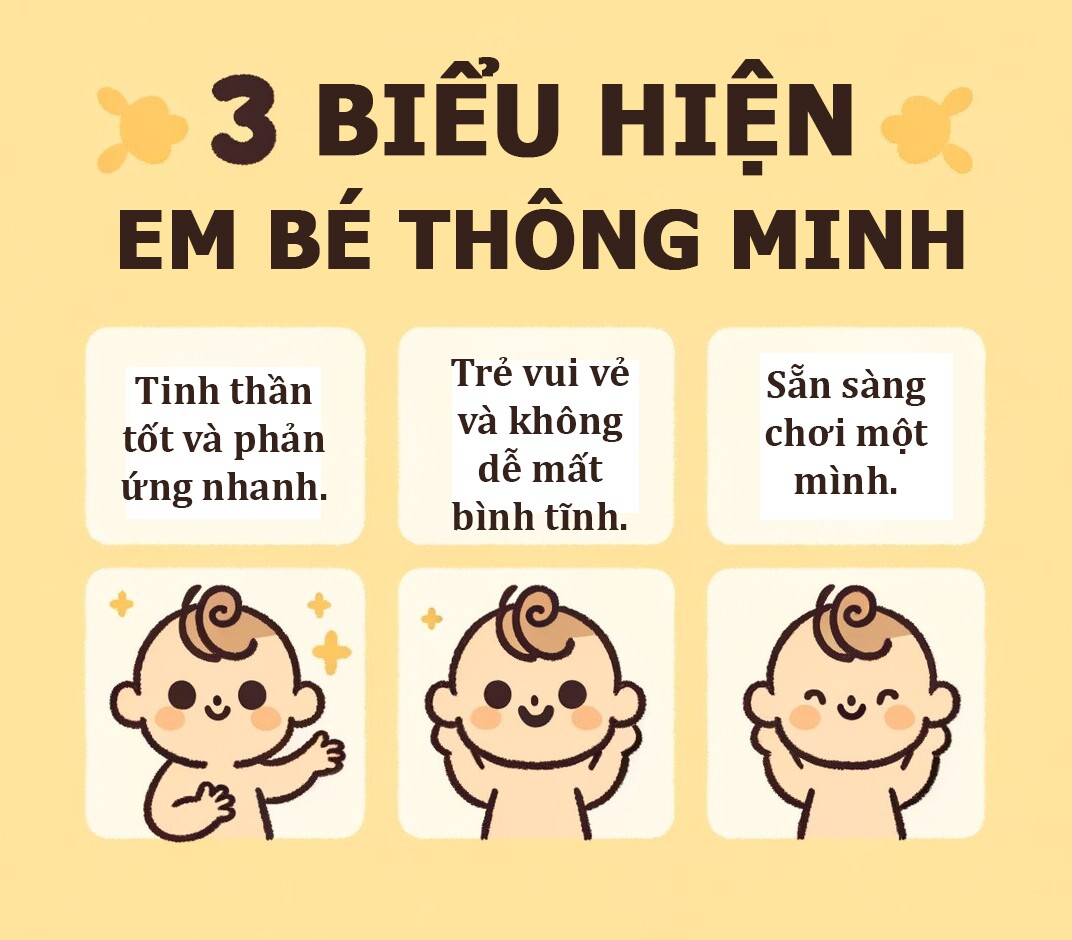The way a child wakes up can actually provide insights into their brain development and emotional well-being. A child who wakes up with a bright smile indicates a sense of security and happiness, suggesting they had a restful and sufficient sleep. Quality sleep is essential for brain development and aids in a child’s recovery.
If a child exhibits any of the following three behaviors upon waking up, consider it a positive sign of healthy brain development and potential future intelligence:


Waking up in a good mood and being quick to react
A child who wakes up full of energy, talking non-stop, and thinking clearly has essentially recharged after a good night’s sleep.
In fact, if a child wakes up and is quick to react in the morning, it means their brain has had adequate rest.
Sleep, especially deep sleep, is not just a time for the child’s brain to rest but also a crucial “background cleanup” period.
Similar to upgrading a mobile phone system, the brain works to sort through the vast amount of information learned, seen, and heard during the day while the child sleeps, storing what is necessary, and rapidly building the neural connections needed to “bridge the gap.”

Especially for children in their growth and development phase, getting enough sleep is akin to deep care and maintenance of their brains.
Therefore, if a child wakes up in the morning, reacts quickly, and thinks clearly, it means their brain has done an excellent job of “organizing” the previous night and is now “turned on,” fully energized, and ready to absorb the day’s information!
Simply put, this is a sign of intelligence.
Of course, some children take a bit longer to adjust to their surroundings upon waking up, and it’s normal for them to feel a bit disoriented. Sometimes, when a child wakes up, they might sit on the bed for a moment before slowly starting to talk.
If your child tends to get confused in the mornings, instead of rushing them to “get up,” try opening the curtains a bit to let the sunlight stream in gently, or play some of their favorite nursery rhymes to gently bring them back from their dreams.

Waking up in a good mood and being quick to react.

Waking up happy and maintaining calm
If your child wakes up with a smile on their face or hums a tune, it indicates that the “emotional switch” in their brain is turned on.
Children learn a lot of new things during the day, filling their minds with images, language, and emotions. At night, the brain slowly “stores and processes” this information.
If a child doesn’t sleep well at night, this information overload can resemble a cluttered desktop that hasn’t been tidied up, and when they open their eyes the next day, their emotions may naturally “explode.”
However, if they sleep well and get enough rest, their brain has the time to gradually digest this information. As a result, when they wake up the next day, their physical and mental state will be positive, making it easier for you to care for them.
Of course, it’s normal for children to have the occasional grumpy morning.
In such cases, instead of reasoning with them or preventing potential tantrums, acknowledge their emotions first.
Gentle interactions can help children gradually build their emotional regulation skills.

The child’s positive physical and mental state makes it easier for you to care for them.

Willingness to play independently after waking up
A child’s ability to play independently is also a sign of healthy brain development.
Sleep not only allows the body to rest but also enables the brain’s “neural network” to organize and store information.
By morning, new connections have been formed, and the brain is ready to “get to work.”
At this point, if a child naturally engages in play or shows interest in something, their focus, self-control, and curiosity are quietly flourishing.
These abilities don’t form overnight but are built upon a foundation of stable brain function, well-regulated emotions, and a healthy lifestyle.
Of course, this ability can also be nurtured and encouraged. Try these two methods:

Provide accessible toys or books
Place books, puzzles, or building blocks within your child’s reach, preferably next to their bed or somewhere easily visible. When children wake up, they often feel curious and want to explore.
Allow some leisure time after waking up
Don’t rush your child to get dressed and eat as soon as they wake up. Give them about 10 minutes to play and ease into the new day at their own pace.
The ability to play independently upon waking stems from a well-regulated brain, emotions that are in check, and the formation of intrinsic motivation.
While it may seem ordinary, this is actually a notable sign of healthy development.
These subtle behaviors upon waking hold many secrets. Even if your child exhibits just one of these criteria, be happy! It means their brilliant little brain is growing and developing healthily.
The Ultimate Guide to Burning Fat and Building Muscle: 5 Easy Yet Effective Ways
“Achieving a lean, muscular physique is a common goal for many, especially those passionate about health and fitness. However, the challenge lies in effectively shedding fat without compromising precious muscle mass. This delicate balance requires a nuanced approach, and that’s where our expertise comes into play. We are here to guide you through this transformation journey with our cutting-edge strategies and techniques, ensuring you attain the body of your dreams.”
3 Ways Chamomile Tea Can Help You Sleep Like a Baby
Introducing the ultimate remedy for sleepless nights – a cup of chamomile tea. Its delicate fragrance and natural sedative properties make it the perfect bedtime companion, helping you drift off into a peaceful slumber. With its calming effects, this tea is a natural solution for those struggling to find a good night’s rest.





































